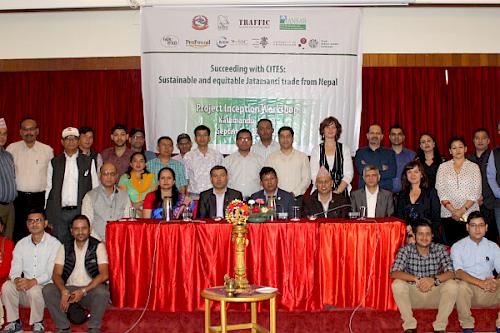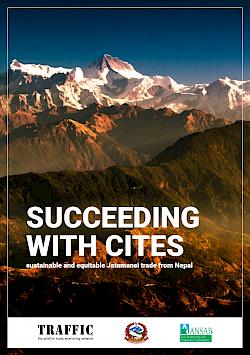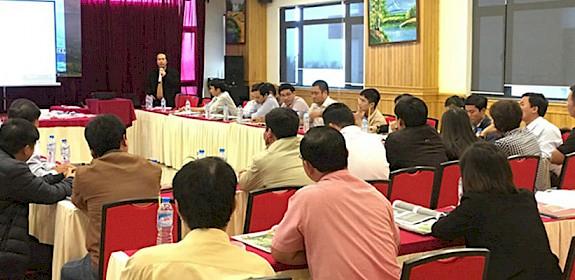Succeeding with CITES: New project aims to promote sustainable wild Jatamansi trade from Nepal
Kathmandu, Nepal, October 2018—a new innovative project supported by the UK Government’s Darwin Initiative was formally launched late last month, aiming to promote legal and sustainable international trade in Nardostachys jatamansi, commonly known as Jatamansi or Spikenard, through use of the international best practice FairWild Standard and certification scheme.

Jatamansi is one of Nepal’s most commercially valuable and heavily exploited species. However, it is listed as Critically Endangered on the IUCN Red List and has been included in Appendix II of the Convention on International Trade in Endangered Species of Wild Fauna and Flora (CITES), to regulate its international trade.
Oil extracted from Jatamansi’s rhizomes is used in the aromatherapy and cosmetics sectors worldwide. Between 100-500 tonnes of rhizomes are sourced from high-altitude (3,000–5,000 m) Himalayan regions, providing at least 15,000 people across nine regions with an average of 25% of their annual income.
However, local income generation is held back by low rates of value addition, a lack of direct access to international markets, undercutting by largescale illegal export of the rhizomes to India and declining Jatamansi populations caused by overharvesting for export and habitat loss, putting both the species and local livelihoods at risk.
The project initiated by a partnership of organizations helps address such factors. It was presented and discussed by more than 30 participants, including Mr. Parbat Gurung, Member of Parliament and Dr Bishwa Nath Oli, Secretary of the Ministry of Forests and Environment, at the launch workshop of “Succeeding with CITES: Sustainable and equitable Jatamansi trade from Nepal”, a project that will run till 2021 and encourage harvesting practices that comply with the FairWild Standard and certification scheme.
The assistance of FairWild principles and robust measures introduced through the project will help traders, collectors and CITES Management Authorities to implement management plans leading to smoother, more traceable and sustainable international trade
Anastasiya Timoshyna, TRAFFIC’s Programme Leader – Medicinal Plants

“Companies involved in the Jatamansi trade also need to understand why sustainable, legal sourcing and trade practices are critical to secure reliable future supplies of Jatamansi.”
Collaborators under the project include the Department of Plant Resources and private companies, who will help producers and harvesters to conduct Jatamansi resource inventories in pilot collection areas in Jumla and Mugu districts, implement monitoring measures and update local management plans. At least 2,000 harvesters will receive appropriate training, which ties will be established with already committed responsible business companies in Europe.
Dr. Bishwa Nath Oli, Secretary of the Ministry of Forests and Environment, spoke of his Ministry’s full support for the implementation of the project in general and more specifically in leading the legislative process for improving regulation of the trade in Jatamansi from Nepal.
Mr. Parbat Gurung, Member of Parliament, noted the need to address the current challenges in the sustainable production and trade of Jatamansi, and lessons from Jumla and Mugu could generate a model for replication elsewhere.
Dr. Bhishma P. Subedi, Executive Director of the Asia Network for Sustainable Agriculture and Bioresources (ANSAB), a key implementing partner in Nepal commented: “The project will address the issues related to conservation and sustainable and fair use of Jatamansi products through sustainable management, enterprise development, market system development especially encouraging a fair trade mechanism, and compliance and effective implementation of CITES.
“Jatamansi is a threatened wild species that is significant from the point of view of conservation of unique biodiversity, the critical Himalaya ecosystem, and livelihoods of the people who are dependent on it. Thus the project can develop a model case study for both other species in Nepal and also globally for such important internationally traded species.”
The Succeeding with CITES project is led by TRAFFIC, with key implementation in Nepal by ANSAB, and endorsement of the Ministry of Forests and Environment. Other partners include the ProFound – Advisers in Development, the Royal Botanic Garden Edinburgh, FairWild Foundation, the IUCN/SSC Medicinal Plant Specialist Group and Department of Food and Resource Economics, and the University of Copenhagen.
About FairWild

The increasing demand for wild plants—as ingredients for food, cosmetics, well-being and medicinal products—poses major ecological and social challenges. The pressure on potentially vulnerable plant species can endanger local ecosystems and the livelihoods of collectors, who often belong to the poorest social groups in the countries of origin.
As a response to these concerns, the FairWild Foundation is working with partners worldwide to improve the conservation, management and sustainable use of wild plants in trade, as well as the livelihoods of rural harvesters involved in wild collection. TRAFFIC has supported the development of the FairWild Standard, and now hosts the organization’s Secretariat under a partnership agreement.
About the Darwin Initiative

Funded by the UK Government through the Darwin Initiative.
The Darwin Initiative is a UK government programme with a focus on biodiversity projects.




